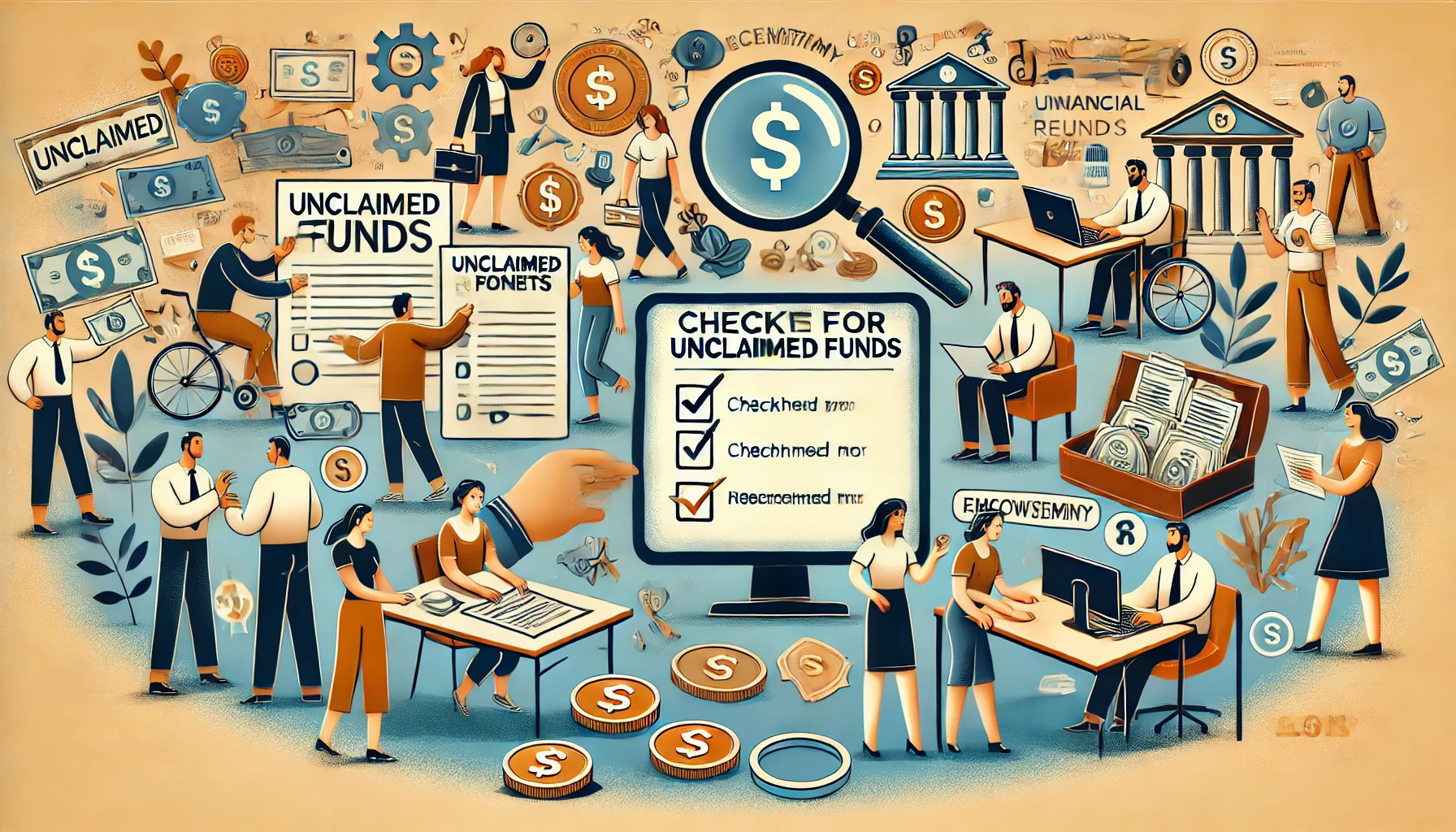Banks Holding Unclaimed Property Funds
Banks play a significant role in holding unclaimed property funds, which typically accumulate from dormant or inactive accounts, uncollected financial assets, or unresolved estate matters. These funds can range from forgotten savings accounts, uncashed checks, or even security deposits that are left unclaimed for years. When account holders, beneficiaries, or property owners fail to access or claim these funds over a set period, the bank is legally obligated to hold these assets in escrow or transfer them to the state, depending on local regulations. The banks serve as custodians, maintaining unclaimed funds and ensuring that they are safeguarded until rightful owners or their heirs come forward to claim them. This can often occur in situations where estate matters become complex or beneficiaries are unaware of the assets, leading to funds remaining unclaimed for long periods. In cases of heavy estate debt, unclaimed funds held by banks become even more critical. These funds might represent the key to resolving outstanding debts, as beneficiaries or estate representatives may not be aware of these hidden assets. Often, people neglect to claim these funds because they are unaware of their existence or due to insufficient record-keeping during estate management. With growing awareness of unclaimed property databases and bank-held funds, banks provide tools and resources for individuals to check if they are owed any unclaimed money. This includes online search tools, government databases, or direct inquiry methods through bank customer service channels, allowing potential claimants to search for and identify unclaimed assets tied to a specific name or estate.
The role of banks in holding unclaimed property funds underscores their responsibility to protect these financial assets while complying with laws that ensure transparency and availability. The recovery process, while regulated, can often be a bureaucratic challenge, requiring thorough verification processes. Banks may require documentation proving ownership or right to claim, such as identification, death certificates, and legal documents related to estate proceedings. However, with due diligence, rightful owners or beneficiaries can successfully reclaim funds, alleviating financial strains, particularly in situations involving estate debt. Thus, understanding the role of banks in holding unclaimed property funds is essential for individuals dealing with unresolved financial matters tied to estates or forgotten assets.
How to Check for Unclaimed Funds:
When it comes to unclaimed funds, the process of checking whether you or an estate you’re managing is entitled to any of these funds can seem daunting, but it’s relatively straightforward with the right guidance. Unclaimed funds may include forgotten bank accounts, uncashed checks, or funds from an estate that have been left inactive for an extended period. Here’s how you can systematically check for unclaimed funds and begin the process of recovery:
 The most efficient way to start your search for unclaimed funds is by using official unclaimed property databases. Many governments, particularly at the state or provincial level, have online databases where banks and other financial institutions are required to report unclaimed property. These databases allow users to input the name of the person or estate and view any available unclaimed funds. You can visit government websites or official unclaimed property portals that provide free search tools. Each state, province, or country might have its own database, and it's essential to check in all relevant locations, especially if the person or estate had dealings in multiple jurisdictions.
The most efficient way to start your search for unclaimed funds is by using official unclaimed property databases. Many governments, particularly at the state or provincial level, have online databases where banks and other financial institutions are required to report unclaimed property. These databases allow users to input the name of the person or estate and view any available unclaimed funds. You can visit government websites or official unclaimed property portals that provide free search tools. Each state, province, or country might have its own database, and it's essential to check in all relevant locations, especially if the person or estate had dealings in multiple jurisdictions. In addition to government databases, banks often maintain their own internal records of unclaimed funds. You can directly contact the bank where the account or funds might have been held and inquire about unclaimed property. The bank’s customer service or estate department will be able to assist in determining if any inactive accounts or funds are listed under the name in question. Be prepared to provide information such as the account holder's name, address, and, if applicable, any relevant estate or property details to facilitate the search.
In addition to government databases, banks often maintain their own internal records of unclaimed funds. You can directly contact the bank where the account or funds might have been held and inquire about unclaimed property. The bank’s customer service or estate department will be able to assist in determining if any inactive accounts or funds are listed under the name in question. Be prepared to provide information such as the account holder's name, address, and, if applicable, any relevant estate or property details to facilitate the search. There are also third-party services and applications that specialize in locating unclaimed funds. These tools can aggregate information from multiple databases, including government and bank records, to streamline your search. While some of these services are free, others may charge a fee for more advanced features or for conducting the search on your behalf. It’s important to verify the legitimacy of any third-party service before sharing personal information to avoid potential scams.
There are also third-party services and applications that specialize in locating unclaimed funds. These tools can aggregate information from multiple databases, including government and bank records, to streamline your search. While some of these services are free, others may charge a fee for more advanced features or for conducting the search on your behalf. It’s important to verify the legitimacy of any third-party service before sharing personal information to avoid potential scams. The most efficient way to start your search for unclaimed funds is by using official unclaimed property databases. Many governments, particularly at the state or provincial level, have online databases where banks and other financial institutions are required to report unclaimed property. These databases allow users to input the name of the person or estate and view any available unclaimed funds. You can visit government websites or official unclaimed property portals that provide free search tools. Each state, province, or country might have its own database, and it's essential to check in all relevant locations, especially if the person or estate had dealings in multiple jurisdictions.
The most efficient way to start your search for unclaimed funds is by using official unclaimed property databases. Many governments, particularly at the state or provincial level, have online databases where banks and other financial institutions are required to report unclaimed property. These databases allow users to input the name of the person or estate and view any available unclaimed funds. You can visit government websites or official unclaimed property portals that provide free search tools. Each state, province, or country might have its own database, and it's essential to check in all relevant locations, especially if the person or estate had dealings in multiple jurisdictions. In addition to government databases, banks often maintain their own internal records of unclaimed funds. You can directly contact the bank where the account or funds might have been held and inquire about unclaimed property. The bank’s customer service or estate department will be able to assist in determining if any inactive accounts or funds are listed under the name in question. Be prepared to provide information such as the account holder's name, address, and, if applicable, any relevant estate or property details to facilitate the search.
In addition to government databases, banks often maintain their own internal records of unclaimed funds. You can directly contact the bank where the account or funds might have been held and inquire about unclaimed property. The bank’s customer service or estate department will be able to assist in determining if any inactive accounts or funds are listed under the name in question. Be prepared to provide information such as the account holder's name, address, and, if applicable, any relevant estate or property details to facilitate the search. There are also third-party services and applications that specialize in locating unclaimed funds. These tools can aggregate information from multiple databases, including government and bank records, to streamline your search. While some of these services are free, others may charge a fee for more advanced features or for conducting the search on your behalf. It’s important to verify the legitimacy of any third-party service before sharing personal information to avoid potential scams.
There are also third-party services and applications that specialize in locating unclaimed funds. These tools can aggregate information from multiple databases, including government and bank records, to streamline your search. While some of these services are free, others may charge a fee for more advanced features or for conducting the search on your behalf. It’s important to verify the legitimacy of any third-party service before sharing personal information to avoid potential scams.The Process of Recovering Unclaimed Property Funds
Recovering unclaimed property funds can be a straightforward process if approached methodically. Unclaimed property funds refer to any financial assets, such as bank accounts, insurance payouts, or estate assets, that have been left unclaimed for an extended period. Whether you’re managing your own unclaimed funds or acting on behalf of an estate, here’s a breakdown of the key steps involved in recovering these assets

- Locate the Unclaimed Funds: The first and most crucial step is to identify where the unclaimed funds are being held. Many countries and states have online databases dedicated to unclaimed property, where you can search by name or property details. Additionally, you may need to contact specific banks, insurance companies, or government institutions directly to track down any funds tied to inactive accounts or unresolved estate matters. It is important to perform these searches in all relevant jurisdictions, especially if the individual had multiple financial relationships across various regions. Once located, the database or institution will typically list the amount and details of the unclaimed property, along with instructions on how to begin the claims process.
- Submit a Claim for the Funds: Once the unclaimed funds are identified, the next step is to submit a formal claim. This typically involves filling out an official claim form, which will be available on the institution’s website or provided by the bank holding the funds. The claim form will require essential information such as the claimant’s identity, relationship to the original account holder (if acting on behalf of an estate), and details of the unclaimed property itself. It is important to be thorough and accurate when completing these forms to avoid delays in processing.
- Verification Process: After submitting your claim, the institution holding the unclaimed funds will begin a verification process. During this stage, they will review the submitted claim form and any supporting documentation to ensure that the claimant is legally entitled to the funds. Typically, the bank or institution will require proof of identity, such as a government-issued ID, and, if applicable, estate documentation like a will, death certificate, or probate papers. This verification process is designed to prevent fraudulent claims and ensure that the rightful owner or their legal heir receives the funds. Depending on the complexity of the claim, this stage can take some time, especially if additional documentation is required.
- Approval and Release of Funds: Once the claim has been verified and approved, the final step is the release of the unclaimed funds. The institution or government body will transfer the funds to the rightful owner, either through direct deposit, a check, or another method of disbursement agreed upon during the claims process. If there are any fees or taxes associated with recovering the funds, they will typically be deducted at this stage. In more complex cases involving large sums or multiple claimants, a legal representative may be required to oversee the distribution of the funds according to estate laws or agreements.
Resources and Support
When dealing with unclaimed property funds, having access to the right resources and support is essential to ensure a smooth recovery process. Whether you’re navigating the complexities of estate debt or simply searching for unclaimed assets, these tools can provide invaluable assistance. Here’s how to utilize helpful links and get in touch with the right experts for support:
- National Association of Unclaimed Property Administrators (NAUPA): This website is an excellent resource for finding unclaimed property in the U.S. across different states. The database consolidates unclaimed assets from various financial institutions and provides direct links to state-specific search portals. NAUPA Unclaimed Property Search
- State Government Unclaimed Property Sites: Each state typically has its own unclaimed property portal, where you can search for unclaimed funds tied to bank accounts, insurance, or estates within that state. For example:
- Canada’s Bank of Canada Unclaimed Balances: In Canada, the Bank of Canada provides a centralized portal to search for unclaimed bank balances. Bank of Canada Unclaimed Balances
- UK Unclaimed Assets Register: For those looking for unclaimed funds in the UK, the Unclaimed Assets Register is a helpful resource that consolidates information across various financial institutions. UK Unclaimed Assets Register
Contact Support

- Bank Customer Service Lines: If you’ve identified unclaimed funds held by a bank, it’s often best to contact their customer service or estate department directly. Banks usually have dedicated representatives who handle unclaimed funds inquiries and can guide you through the necessary steps. Some major banks also offer online support tools specifically for unclaimed property recovery.
- Legal Advisors Specializing in Estate Debt Recovery: For more complicated cases, particularly those involving significant estate debt or disputed ownership, consulting a legal advisor can be vital. Lawyers specializing in estate law or financial recovery can help you navigate the paperwork, verify ownership, and ensure that all legal aspects are addressed correctly. They can also assist in resolving disputes between multiple heirs or claimants.
- Financial Advisors: In some situations, it may also be beneficial to work with a financial advisor who specializes in estate planning and management. Financial advisors can help you assess the broader financial impact of recovering unclaimed funds, including any tax implications or strategies for managing newly recovered assets.
Services provide
for you
Excited for a new venture, the opportunity delivered far more than expected. Despite questions, each step exceeded expectations, leading to fulfillment. Efforts extended beyond, with outcomes outweighing all challenges. The journey’s rewards proved remarkable.

